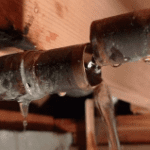
But there is new data that suggests that you may be ignoring one of the biggest dangers of all – leaks. A recent survey found that before leaving on vacation, nearly 80 percent of homeowners do nothing at all to protect against the damage that can be caused by a runaway leak. In fact, for the majority of homeowners, leaks barely even register as a concern. Only 19 percent view water damage as a top threat to homes left unattended by vacationing owners.
But industry statistics prove not only that the risk exists, but also that homeowners spend more than you might think to recover from leak-related incidents. The Insurance Information Institute concluded that homeowners submitted more claims for water and freeze damage than for almost anything else between 2010-2014. Furthermore, water damage appears to be growing more common. In 2011, water damage accounted for only a quarter of property damage claims, whereas in 2015, it accounted for almost half. What’s more, the Institute calculated that the average claim amounted to almost $8,000.
How can water do so much damage? Well, you can’t fix a leak if you’re not at home to notice. It’s your absence that allows for even a minor leak to do major damage.
Prevention demands little of the homeowner. The simplest method of sidestepping the problem takes only a few seconds and costs nothing – shutting off the water main whenever you leave home for more than a night or two. Only 22 percent of homeowners do this, but cutting off the home water supply provides the most effective and comprehensive solution, given that most leaks occur in the plumbing system itself. Another option: place leak alarms in any areas where you’ve had leak problems in the past, or where you suspect there may be one in the future. Doing so doesn’t prevent leaks, but it helps prevent the worst water damage.
Think of it this way: water courses through a network of pipes that spans the entire house in service of a diverse range of fixtures and appliances, everything from the toilet to the dishwasher; water literally surrounds us. But as much as we rely on it, and as much as we take it for granted, water never stops being a natural enemy of wood, drywall, and other key materials that make our homes healthy, safe and aesthetically pleasing places to liv. In this fragile situation, where we must closely co-exist with water, leaks are more of an inevitability than a surprise.
Thanks to Donna Boyle Schwartz for writing this great article for the Bob Vila Web site.

